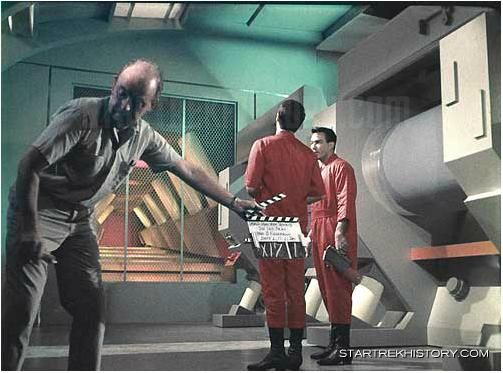I'm going to argue with you below, on more minor points; but I fully agree with you here. Season 1 Kirk is conscious of his duty, and committed to it. I think I didn't say anything to the contrary, in my post that you were replying to. But it's clear Kirk likes the ladies too, even in season 1. Not enough to overwhelm his good sense or his responsibilities; but he likes them. That doesn't make him a shallow womanizer; just a man. I'm not sure if we disagree on this, or not?
I never said anything to the contrary. Inded, I did explicitly state already that yes, clearly Kirk is a man who feels deep longing for female companionship. I have no idea why you'd think I'm denying something that I have already acknowledged more than once. The point is simply that it wasn't the shallow womanizing or even predation that some people imagine it to have been -- that most of Kirk's romantic encounters in season 1 fall into the categories of 1) old flames from before his captaincy (Ruth, Areel), 2) women he's manipulating for purely pragmatic, duty-driven goals (Lenore, Andrea), 3) women who make advances on him that he rebuffs because he's fixated on duty (Eve, Janice in "Miri"), or 4) women he's pursuing because he's in an altered mental state and isn't himself (Janice in "The Enemy Within," Helen). Edith Keeler is the
only woman in the entire first season whom Kirk initiates an actual romantic relationship with while in his right mind (Areel is a pre-existing relationship), and that's after getting to know her over the course of what may have been several weeks.
Oh god, PLEASE don't bring Requiem For Methuselah into it. That episode cannot be a basis for forming any conclusions about the character of Kirk. The episode is godawful, and Kirk is somewhere between erratic and insane in it.
Actually it's one of my very favorites. True, the romance is compressed to an implausible degree (which could've been fixed simply by changing the "four hours" reference in the teaser to two days or something), and Spock is a bit out of character as a sudden humanities scholar, but the writing is brilliant and poetic.
And the point is that, whatever the problems in how the romance is portrayed, it's consistent with how Kirk had already been portrayed throughout the series. When he fell in love, he fell deeply and devotedly, even too passionately for his own good. We see it on his face when he's "reunited" with Ruth, even though we're told no specifics. We see it in his love for Edith Keeler, the only romantic entanglement that ever came close to making him abandon his duty.
Um: the reality is that Jim Kirk was a fictional character who was inconsistently written.
No need for that, now. I'm not pretending Kirk was a real person. I'm speaking of the reality of what the text of the work of fiction entitled
Star Trek actually portrays about the character of James T. Kirk, as opposed to the misconceptions about the contents of that text that many people have. For instance, the myth asserted in this thread is that "The Conscience of the King" portrayed Kirk engaged in sexual predation upon an underage girl, where the reality is that the text of the episode portrays the character of Kirk using the pretense of romantic interest in a young adult woman in order to gain information about a suspected mass murderer. Do you see what I'm saying now?
As for inconsistency, yes, there was a change in the way Kirk was written after season 1, as he evolved into a more conventional '60s action hero. But even so, he was still never quite the rampant Lothario that the myth alleges. Let's go over it:
"Catspaw": Sylvia seduces him, he plays along for the sake of survival.
"Wolf in the Fold": He enjoys watching a belly dancer and suggests visiting a place where "the women are so..."
"Mirror, Mirror": He plays along with Marlena as "the Captain's woman" for the sake of maintaining his cover, and ends up winning her over by treating her with respect.
"Bread and Circuses": He is offered a night with a slave girl and makes only a token protest about her right to choose. Probably his lowest moment.
"A Private Little War": He is drugged and seduced by Nona in pursuit of her political ambitions.
"The Gamesters of Triskelion": He romances Shahna, but it's largely about gathering information and winning her allegiance to assist in an escape.
"By Any Other Name": He attempts to seduce Kelinda as part of a plan to free the ship -- and bombs spectacularly.
"Return to Tomorrow": An alien entity uses his body for romantic interaction with an entity in Anne Mulhall's body.
"Elaan of Troyius": He is drugged and seduced by Elaan in pursuit of her wish to avoid marriage.
"The Paradise Syndrome": He loses his memory, falls in love, gets married, and conceives a child.
"Is There in Truth No Beauty?": He attempts to seduce Miranda so as to distract her from Spock's meld with Kollos -- and bombs even more spectacularly.
"Wink of an Eye": He is pursued as a prospective mate by Deela and plays along,
mainly in hopes of survival and escape. Since Deela is trying to get pregnant, it's probably her idea that they have sex.
"Whom Gods Destroy": He is seduced by Marta, who then tries to kill him.
"The Mark of Gideon": He is manipulated into developing feelings for Odona, which works.
"Requiem for Methuselah": He is manipulated into developing feelings for Rayna, which works astonishingly well.
Even in seasons 2 and 3, the pattern was mostly not that different from season 1. He was the pursued more often than the pursuer, and when he did pursue women, it was usually a ploy to advance a more pragmatic goal, or as a result of not being in his right mind. He was more receptive to romance than in season 1, quicker to attempt seduction as a ploy, but still he was rarely shown as the aggressor. He was willing to get some action while on shore leave, but otherwise he still put duty first. The one real outlier is "Bread and Circuses," but even spending the night with the slave girl could've been duty-driven to an extent, an attempt to lull the Proconsul into thinking Kirk was playing along (although that's a pretty lousy justification for what was essentially a rape, since a slave cannot actually give consent). In that case, I'd say that Kirk was written out of character; and "Requiem" exaggerated an aspect of his character. But otherwise, I think that Kirk was written pretty consistently.
Yes, something happened between Kirk and Helen prior to the start of Dagger of the Mind.
The whole point of the neural neutralizer scene is that the memory of the romantic encounter was false. "At the Christmas party, we met, we danced, you talked about the stars. I suggest now that it happened in a different way. You swept me off my feet and carried me to your cabin." It couldn't be more explicit that there was no actual tryst. The reason Kirk was embarrassed was simply because this was first-season Kirk, a man more driven by duty than romance and uneasy about any prospect of fraternization with a member of his crew, as any responsible commander would have been.
??? Where on earth are you getting any of that? That's a lot to read into a couple of glances, with almost no dialogue. "Painful" and "regret" are complete projections on your part. Kirk just doesn't say very much to Ruth, or about Ruth. We've got damn little to go on.
We have Shatner's performance, which was very intense and yearning and not even remotely like a shallow, predatory Lothario only interested in sex. We have Gerald Fried's music, which was sweet and pastoral and poignant and, in its bridge portion, quite sad and elegiac. That tells us all we need to know about the tone the reunion was meant to have. Dialogue is not the only way to convey character or emotion.
When he plucks the rose and starts reminiscing, just before Ruth appears, he has a fond smile on his face. Clearly his memories of her are not all painful.
I didn't say they were. I said he clearly cared deeply for her and regretted the loss of her.
It's odd that you would contrast Kirk's behavior vs "the shallowness of McCoy conjuring up the Rigel II cabaret girls." What's more immature than walking around with a replica of your ex-girlfriend, pretending that everything is the way it was?
Pretending is not immature at all. The whole purpose of that planet was to pretend. Fantasy is a healthy part of life. It would be immature to attempt to pursue a real relationship with an android simulacrum, but as a simple reminiscence in an environment where pretending was allowed and invited, a brief indulgence to be set aside afterward? It doesn't seem that bad.
Besides, I'm not talking about the present day of the episode, I'm talking about the real Ruth and the nature of the relationship Kirk seemed to have with her. It was clearly about strong emotion and caring, not shallow, detached lust.
You didn't comment on my note about Areel in Court Martial, possibly overlooked it. Kirk's interaction with her in the bar reads like he's interested in setting up a "friends with benefits" situation.
I don't see anything to debate there. Again, you seem to have the totally false perception that I was somehow denying that Kirk had any romantic feelings at all in season 1. Since that is not at all what I'm claiming, the example of Areel does not refute or conflict with my position in any way. All I'm saying is that Kirk was not Don Juan, that he wasn't an addictive womanizer who tried to bed every woman he met. He had a romantic side that he generally kept in abeyance due to his preoccupation with his duty, but he also had women in his past that he sincerely cared about, and the hope that he could someday find time for real love in his future.
Kirk isn't this delicate flower whose heart needs to be sheathed in bubble wrap. He's a mature professional man, very comfortable in his world and his profession, who likes a good woman and would be interested in settling down with the right one – some day. But he doesn't have time for that now, given his career and sense of responsibility.
We're not really that far apart here. I think you're caricaturing my position. I agree with everything in those last two sentences, but saying that Kirk has a tendency to fall in love sincerely and deeply does not mean he's a "delicate flower." It just means that he's more a romantic than a Lothario.
And it's a little bit interesting that Cadet Kirk (age, what? 17?) was involved with a woman who was portrayed by a 32 year old actress and who therefor looks herself to be about 32 years old.
I've seen a fan theory that Ruth was an older woman that Cadet Kirk had a Mrs. Robinson-ish thing for. It's kind of surprising that no novel or comic or short story I'm aware of has ever tried to flesh this out.









